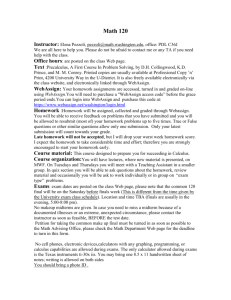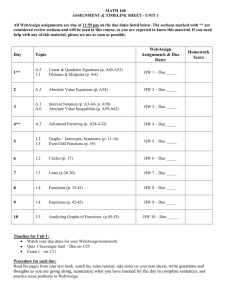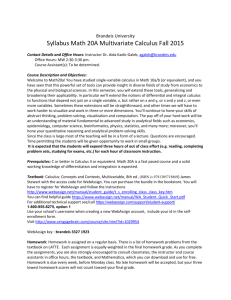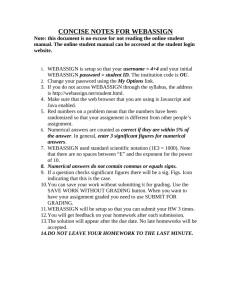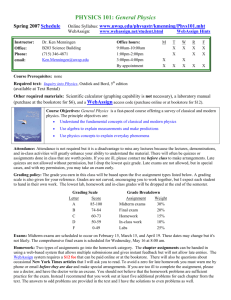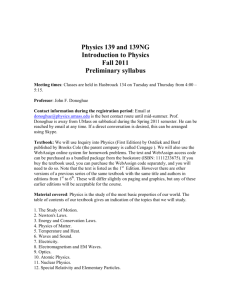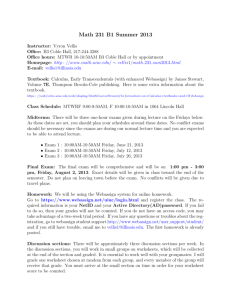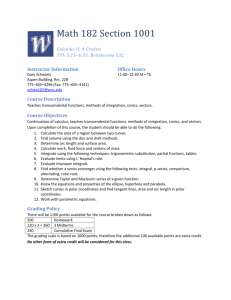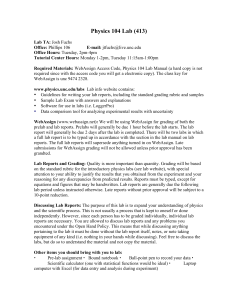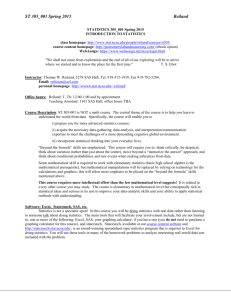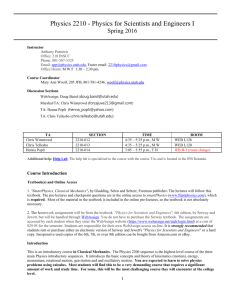Physics 1425 - University of Virginia
advertisement
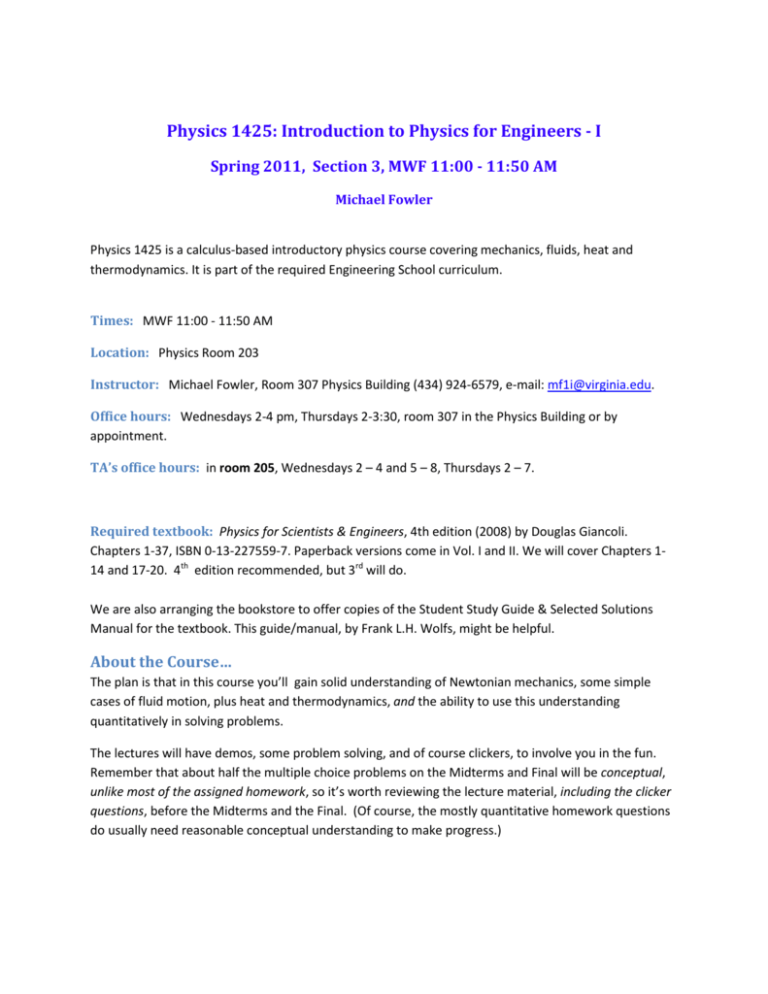
Physics 1425: Introduction to Physics for Engineers - I Spring 2011, Section 3, MWF 11:00 - 11:50 AM Michael Fowler Physics 1425 is a calculus-based introductory physics course covering mechanics, fluids, heat and thermodynamics. It is part of the required Engineering School curriculum. Times: MWF 11:00 - 11:50 AM Location: Physics Room 203 Instructor: Michael Fowler, Room 307 Physics Building (434) 924-6579, e-mail: mf1i@virginia.edu. Office hours: Wednesdays 2-4 pm, Thursdays 2-3:30, room 307 in the Physics Building or by appointment. TA’s office hours: in room 205, Wednesdays 2 – 4 and 5 – 8, Thursdays 2 – 7. Required textbook: Physics for Scientists & Engineers, 4th edition (2008) by Douglas Giancoli. Chapters 1-37, ISBN 0-13-227559-7. Paperback versions come in Vol. I and II. We will cover Chapters 114 and 17-20. 4th edition recommended, but 3rd will do. We are also arranging the bookstore to offer copies of the Student Study Guide & Selected Solutions Manual for the textbook. This guide/manual, by Frank L.H. Wolfs, might be helpful. About the Course… The plan is that in this course you’ll gain solid understanding of Newtonian mechanics, some simple cases of fluid motion, plus heat and thermodynamics, and the ability to use this understanding quantitatively in solving problems. The lectures will have demos, some problem solving, and of course clickers, to involve you in the fun. Remember that about half the multiple choice problems on the Midterms and Final will be conceptual, unlike most of the assigned homework, so it’s worth reviewing the lecture material, including the clicker questions, before the Midterms and the Final. (Of course, the mostly quantitative homework questions do usually need reasonable conceptual understanding to make progress.) The homeworks will be WebAssign. This will give you plenty of practice at the quantitative stuff. You can discuss the problems with other students, but you should finally work through the problem on your own. This is a great way to be ready for the exams! Using Cramster.com or any other web source of answers to specific problems is like a basketball player paying somebody else to put the ball in the hoop during practice sessions. That’s a great way to save time during practice, but what happens at show time? Duh. (OK, you can look at Cramster after you’ve sweated for a while, and have an answer, but please don’t fool yourself about how well you’ve got it.) Remember all the homework together is only 20% of your final grade, the midterms and final add to 70%. Grades How your grade is determined: o o o o Clickers (Class Participation): 10% Homework: 20% 3 midterm exams: 35% total Final exam: 35% We will strive to have approximately 25% of the class getting an A (A+, A, A-) and approximately 50% of the class a B (B+, B, B-). We expect the average grade to be slightly below 3.0. Three Midterm Tests o o o Wednesday, February 16, 11:00 am, Room 203 Wednesday, March 30, 11:00 am, Room 203 Wednesday, April 27, 11:00 am, Room 203 Note: No make-up exams are given! With a valid excuse (official university travel, religious holidays, personal illness, or death/illness of an immediate family member) before the exam, you will be given your average grade on the other two midterms. This will not be adjusted to allow for possible changes in overall average grades on the midterms. Without a valid excuse before the exam, the exam grade will be a zero. The midterm exams and the final exam will be multiple choice, mixtures of quantitative problems (like the homework, but probably shorter) and conceptual questions. Final Exam: Thursday, May 5, 2011, 9:00-12:00 am. Homework Weekly, WebAssign, normally be due Friday morning at 5 am. Link to WebAssign for UVa students and faculty. Look here for homework. Your username and password are the same as your UVa email account. Student Guide to WebAssign. Look here if you need help in using WebAssign. NOTE: Sections 1, 2, and 3.3 do not apply to UVa students accessing WebAssign via WebAssign for UVa link. UVa folks use their CMS username and password to log in. You typically will receive 10 submissions on WebAssign to obtain the correct answer. This means the average homework score in the class will be very high. Many of you will obtain 100%, and the average score is likely to be near 95%. This means your grade will suffer considerably if you do not do the homework. We encourage you to try every problem by yourself for the first 3 or so submissions. Then perhaps work with another student or form a study group. The homework is not pledged. Don’t be surprised if you see a question similar to the homework on a midterm or final exam. WebAssign uses random numbers: different for each student. No extra credit or makeup assignments will be given. Keep up! Any request for an extension must be made before the due date, not after. Clickers Every student will be required to bring their own iclicker to class to answer questions throughout the lecture. The Student Advisory Committee last semester suggested we count the clickers as 10% of your final grade, and we’ll do that again this semester. You will be able to use the same iclicker that you used last semester, but you will need to reregister it. You may also use a transmitter that has been previously used by another student, after you register it in your name. iclickers are for sale at the Newcomb Hall University Bookstore. You may be able to sell the transmitters back to the bookstore when the class is finished. Attendance Policy Attendance at all lectures is strongly recommended. You are responsible for knowing the problem assignments, and for any announcements made in lecture of changes in the assignments, schedule, etc. General Information Course Rules and Regulations: 1. Illness (as an excuse) must always be established in writing. Email is sufficient. 2. If you do not turn in an assignment (including homework) on time or miss an exam (including being late and for illness), you will receive a grade of zero, unless you have prearranged approval by your professor. Messages of any kind including, but not limited to, email, telephone message, oral messages of any kind, notes delivered by a third party, etc., are not acceptable by themselves without a response from your professor. Any oral approval given by your professor must be confirmed in writing. 3. There will be no rescheduling of exams or quizzes. Exams and quizzes are excused only for instructor approved personal or family medical emergencies, official university travel, or certain religious holidays. 4. The following is unacceptable in class: newspaper reading, cell phones ringing or in use, use of laptop computers or other personal electronic devices.
